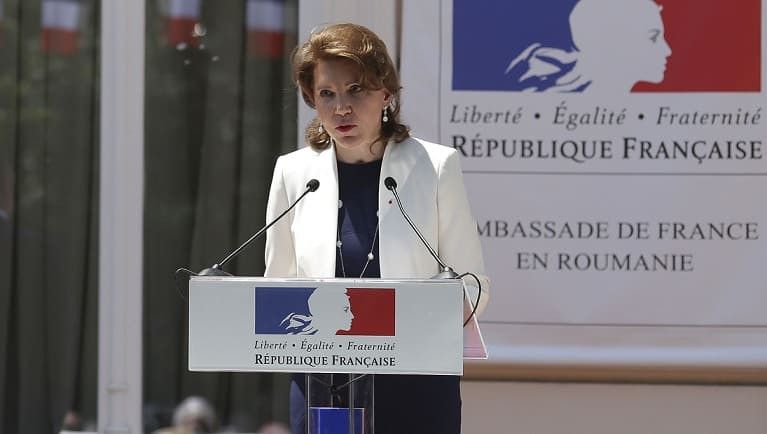
Ambasadoarea Michele Ramis, de Ziua Franței: ”Încurajăm toate eforturile ce vizează păstrarea şi apărarea statului de drept şi independenţei justiţiei”
Ambasadoarea Franței la București, Michele Ramis, a încurajat România să apere statul de drept și independența justiției și a felicitat poporul român pentru că a rezistat tentației naționalismului și euroscepticismului. La recepția de ziua națională a Franței au participat președintele Klaus Iohannis și mai mulți miniștri, dar au lipsit președinții Parlamentului, Liviu Dragnea și Călin Popescu Tăriceanu.
În mesajul de sâmbătă, cu ocazia zilei naționale a Franței, Michele Ramis a vorbit despre succesul Preşedinţiei române, anul viitor, „în direcţia unei Europe a convergenţei, protectoare, mai puternică în lume şi bazată pe valori comune. Aceste valori comune reprezintă fundamentul unităţii europene, iar în relaţiile noastre cu România, precum şi cu ceilalţi parteneri, încurajăm toate eforturile ce vizează păstrarea şi apărarea acestor valori, printre care statul de drept şi independenţa justiţiei ocupă un loc central”, a mai spus Ramis, potrivit Agerpres.
„Vedem în România un partener de prim-plan pentru a duce mai departe acest proiect. Salut spiritul european al poporului român, deoarece a ştiut să reziste naţionalismului şi euroscepticismului care, din păcate, se dezvoltă pe continent. Şi salut, de asemenea, munca noastră comună cu autorităţile române pentru a face să avanseze Europa în fiecare zi, fie că vorbim despre consultările europene sau de progrese marcante, precum revizuirea regimului lucrătorilor detaşaţi”, a mai spus ambasadoarea Franței la București.
Michele Ramis a mai spus că România are „una din cele mai dinamice economii din Uniunea Europeană. Întreprinderile noastre cred în potenţialul său. Ele au nevoie, în mod natural, de un mediu stabil şi previzibil pentru a continua să investească şi să creeze locuri de muncă”.
Foto: InquamPhotos / Octav Ganea
Urmărește mai jos producțiile video ale G4Media:

Donează lunar pentru susținerea proiectului G4Media
Donează suma dorită pentru susținerea proiectului G4Media
CONT LEI: RO89RZBR0000060019874867
Deschis la Raiffeisen Bank
8 comentarii